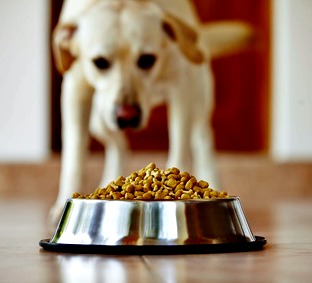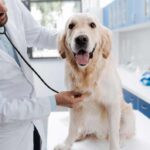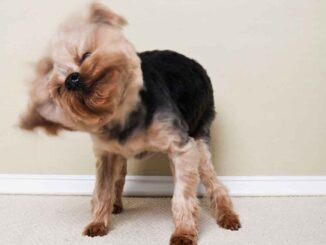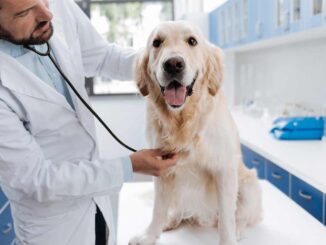
This article was updated on October 28th, 2021
If your dog suffers from vestibular disease, you’ll know how much they can struggle to eat. Many dogs with vestibular syndrome will tilt their head, stumble, circle and even collapse to the floor. This is all happening because of interference with your dog’s vestibular system – an intricate apparatus found within the inner ear that is responsible for maintaining balance.
Vestibular disease should always be investigated by your vet as some causes might be treatable. However, if your dog has been diagnosed with ‘idiopathic’ vestibular disease (cause unknown) then it may be a while until their symptoms improve, if at all. Vestibular disease is more common in older dogs and some dogs may always have some degree of balance problems; it is therefore important to make your wobbly dog’s life as easy as possible.
In addition to swaying from side to side and generally struggling to keep their head focused on the food bowl, dogs with vestibular disease often don’t want to eat because they feel sick. Anti-nausea medicines prescribed by your veterinarian can help with this. Here is a list of changes you can make to make the act of eating as simple as possible for your dog:
Make His Meals More Appealing
Make his meals more appealing by adding tasty gravy, or a little canned food, to his kibble and encourage him to eat while lying down if he’ll co-operate. Some dogs pretty much refuse to eat, or the physical symptoms make it very difficult for them to do so. This stage generally only lasts a few days.
Palatable food will encourage your dog to eat, even if they are feeling nauseous. Try to feed them little and often to help make sure they keep their food down.
Use Supplements
However, to make sure that Fido gets some nutrition during this stage you can try liquid nutritional supplements such as PetAG’s Dyne liquid supplements or Tomlyn’s Nutrical Nutritional Gel, as featured in the two listings below:
Sale
Dyne High Calorie Liquid for Dogs, 16…
- Provides liquid calories to support weight gain, provide energy, and promote overall health
$30.00
Sale
Tomlyn NutriCal Tube Dog 4.25oz
- Nutritional oral gel for dogs who need extra calories and vitamins; ideal for finicky or aging dogs
$9.99
Both of these are nutritionally dense and even getting a little of one or other into your dog will give him valuable nutrition – important if your dog isn’t eating enough of their normal food. Your vet may stock one, or both, of these or you can order them online through the links above.
If he insists on standing, stay beside him and hold him up if necessary. Drinking poses the same problems, but your dog MUST drink, or he’ll get dehydrated, so the same help is needed here. Pedialyte contains vital electrolytes so try to give your old boy or girl a little of the unflavored variety as well as water if you can. If he won’t/can’t drink, then discuss it with your vet – he might want to give Fido some IV fluids to make sure he stays hydrated.
Make it Easier for Them to Drink and Eat
You should try to make it as easy as possible for your dog to eat and drink. For example, bring food and water to your dog, and use elevated bowls so that they don’t have to put their heads down too much.
You should also place their bowls against a wall or in a corner so that your dog can get support when losing balance.
You can even use a harness to help your dog stay steady whilst they are eating. If necessary, you may need to hand feed your dog at first so that they don’t have to concentrated on keeping their head still in the bowl. In extreme cases you can even syringe feed food and water directly into their mouth
Use Omega 3 to Reduce the Chances of Further Episodes
Once a dog has suffered one go-around with this problem, he has an above-average risk of having another. New episodes are usually similar to the first one in both severity and duration.
Although this isn’t ideal, the good news is that IF Fido has another ‘episode’, you’ll know what it is right away and won’t feel so panicked. Plus, you’ll be able to get him any medications he needs, and know how to help him through those first, difficult, days.
Although there are no treatments that are guaranteed to prevent further episodes of old dog vestibular disease, there are a few things you can do to help Fido heal completely and possibly reduce the chances of experiencing the whole thing again. These include: Giving an Omega 3 EPA & DHA Fish Oil will help your dog’s body to heal and regenerate to its full potential. We recommend the following from Ascenta:
Ascenta Canine Omega3 Supplement, 200ml
- The Pure Check logo guarantees that this product has been independently tested and certified for quality , purity and label claims
$14.06
Give a premium vitamin/mineral supplement daily to make sure all body systems have the nutrients they need to function properly. A few examples of these supplements are featured below:
Premium vitamin or mineral supplements on Amazon:
Dr. Harvey’s Herbal Multi-Vitamin and Mineral…
$16.94
Pet MD – Canine Tabs Plus 365 Count – Advanced…
$34.95
NaturVet All-in-One Dog Supplement – for Joint…
$20.99
Nutrition Strength Multivitamins for Dogs, Daily…
$38.99
Collar related injuries can cause vestibular problems, and an accidental pull or jerk could trigger an episode. So… it’s best to use a harness rather than a collar when walking your dog if they’ve had vestibular disease previously.
Complementary health practices such physiotherapy and acupuncture can all have benefits after the initial recovery period.
Allergies can cause chronic ear infections in dogs which can lead to vestibular episodes. Your vet can help you decide if this might be a problem for your senior dog; medication is available if your dog is a long-term allergy sufferer. Take things slowly and allow your dog to return to normal activities at their own pace.
Medication from the Vet That May Help
Often dogs with vestibular disease don’t want to eat because they feel sick. Anti-nausea medicines prescribed by your veterinarian can help with this.
If the vestibular episode if short lasting, then your vet may want to give a one off anti-emetic injection to prevent sickness. If the sickness is going on for longer, tablets are available that can help with sickness although these should only be used when absolutely necessary. If your dog isn’t actually vomiting and is still eating okay, then avoid giving these for the time being.
If you are worried your dog isn’t getting any nutrients at all then they may need to be hospitalized for intravenous fluid therapy and to be given nutrition. In extreme cases sometimes a temporary stomach tube needs to be placed to allow food to get to the stomach.
Final Words
Keep in mind that you should take your dog to the veterinarian if you observe symptoms of vestibular disease. Symptoms could indeed be a sign of that there is a more serious underlying condition that needs addressing. You should also keep in mind that you should not give your dog any supplements, even over-the-counter, without first discussing it with your vet.
The majority of dogs will show signs of improvement within about 72 hours and be fully recovered within 2 weeks. But, if your old dog doesn’t seem to be any better after a couple of days, or he gets worse or shows other symptoms, get him back to your vet asap.
Related Posts About Vestibular Disease in Dogs:
 Should You Euthanize A Dog With Vestibular Disease? - After 14 years of working as a vet, I can diagnose some client concerns in an instant. When a client… [...]
Should You Euthanize A Dog With Vestibular Disease? - After 14 years of working as a vet, I can diagnose some client concerns in an instant. When a client… [...] Can Vestibular Disease Kill a Dog? - Vestibular disease arises spontaneously, and, often, resolves itself in the same way. For the most part, vestibular disease is a… [...]
Can Vestibular Disease Kill a Dog? - Vestibular disease arises spontaneously, and, often, resolves itself in the same way. For the most part, vestibular disease is a… [...] Recurrence of Dog Vestibular Disease - In many cases, vestibular disease resolves itself spontaneously: most dogs will start to improve within 2 to 4 days, with 71%… [...]
Recurrence of Dog Vestibular Disease - In many cases, vestibular disease resolves itself spontaneously: most dogs will start to improve within 2 to 4 days, with 71%… [...] What to Do if Your Dog Is Not Recovering from Vestibular Disease - Being able to maintain balance is a pretty basic ability, so losing your footing makes life very difficult. The symptoms… [...]
What to Do if Your Dog Is Not Recovering from Vestibular Disease - Being able to maintain balance is a pretty basic ability, so losing your footing makes life very difficult. The symptoms… [...] Dog Vestibular Disease: a Veterinarian Guide for Dog Owners - Old Dog Vestibular Disease can be triggered by a number of things, including inner ear problems, a collar-related injury, a… [...]
Dog Vestibular Disease: a Veterinarian Guide for Dog Owners - Old Dog Vestibular Disease can be triggered by a number of things, including inner ear problems, a collar-related injury, a… [...]Disclaimer: This website's content is not a substitute for veterinary care. Always consult with your veterinarian for healthcare decisions. Read More.





Be the first to comment